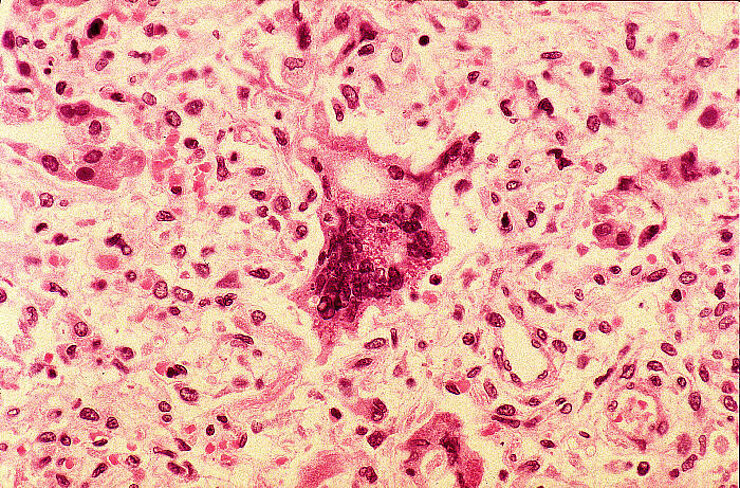Measles - Fear of vaccination makes people ill
Again and again headlines like "Measles epidemic in Berlin - Full risk, fatal consequences" (Süddeutsche Zeitung), "Infection: Measles are much more dangerous than the vaccination" (Die Zeit) or "Measles epidemic unabated" (Frankfurter Allgemeine Zeitung) cause commotion and heated debates in the general population, amongst medical professionals and politicians. Indeed, the reason for the outbreaks appears to be quite simple.
The outbreak of measles in 2015 - most pronounced in the Berlin region - was one of the largest in Germany since the Law on the Prevention of Infectious Diseases became effective in 2011. There were 1,243 new measles cases just in Berlin. According to the expressed goals of the federal government, there should be no more than 82 cases of measles - per year and throughout the entire country. This shows quite early in the year that the plans to eradicate this infectious disease by 2015 have failed. Despite the promises the federal government made to the World Health Organization (WHO).
The reason for the outbreak appears to be quite simple: Lack of protection through vaccination. An inexpensive and efficient vaccine against the pathogen has been available since the 1960s, but it is used too rarely. Not least because many Germans are afraid of the side effects of vaccinations, the vaccination rate in this country is lower than in other European countries. Moreover, many adults are insufficiently protected since they forgot to booster the vaccination or never were aware of the significance of boosting.
Lethal pathogen
This disease is quite serious. Anette Siedler, head of the Immunisation Division of the Robert Koch Institute, responded to a question from "Die Zeit": "Measles should not be taken lightly by any means, neither in adults nor in children. Once you get the disease, you will wish you had gotten the vaccination." The virus is present exclusively in humans and is transmitted by direct contact or by droplet infection, which means that the disease is very contagious. Measles were long considered to be a paediatric disease, mainly because most adults had already been afflicted by measles and were therefore immune to the virus.
In reality, though, adults can also become infected and since it often takes a long time to link the symptoms to measles, the disease can cause even more damage in adults than in children. While the first signs, like typical symptoms of the common cold such as sniffling and fever, appear fairly harmless, the disease can also have much more severe consequences. According to estimates of the WHO, 158,000 people throughout the world died in 2011 due to a meningitis caused by the virus. Before the advent of the vaccine, the number was even higher (548,000 people annually).
Efficient vaccine

The vaccination uses a live virus vaccine that is produced from attenuated measles viruses. Often, the vaccination is directed against mumps and rubella as well, and hence the vaccine is called MMR vaccine. When the vaccine is present in the body, the cells of the immune system recognise that a pathogen has entered the body.
The immune system can handle this pathogen, because it is strongly modified and weakened. This allows the defence cells of the human body to learn how to recognise and control measles viruses. The body never loses the ability to produce antibodies against the virus, which protects us, if we are ever exposed to the virus again. To make absolutely sure that the vaccine is effective, it has been standard in the past 25 years to vaccinate children twice.
Andrew Wakefield and fear of the vaccination
Vaccinations are a good way to eradicate this infectious disease. However: Many people are still afraid of side effects of the vaccination. A fear that has been fuelled time and again by so-called experts.
The biggest scandal in this context occurred in 1998, when the British physician, Andrew Wakefield, published a study in "The Lancet“, a medical journal, claiming that there was a link between the MMR vaccine and autism in children. It became evident later on that the study was manipulated and faulty. But it impacted the vaccination rates which dropped drastically after publication, mainly in the United Kingdom. Studies still show that Wakefield's publication has a detrimental influence on the vaccination behaviour.
The fear persists despite all the studies demonstrating the opposite, and even though the actual side effects caused by vaccine are considered harmless. As is the case with any vaccination, there may be some reddening or mild fever. These symptoms are truly minor compared to the damage an infection by the virus may cause.
Introduction of a compulsory vaccination
In particular, babies who are too young for vaccination or persons who cannot be vaccinated for medical reasons are particularly at risk from the highly infectious measles. So far, the rate of 95 percent of those in Germany who have received two measles vaccinations has not been reached. This quota is necessary for an efficient community protection ("herd immunity"), where unvaccinated persons are also protected.
For this reason, the Bundestag and Bundesrat decided at the end of 2019 to introduce a compulsory measles vaccination for certain groups of people. Previously, this vaccination was recommended, but was voluntary. The new compulsory vaccination applies to children from the age of one when they enter kindergarten or school and to employees of community or medical institutions (e.g. educators, teachers, medical staff). It came into effect on 1 March 2020. According to the German Federal Ministry of Health, the introduction of a compulsory vaccination will be accompanied by intensified measures to educate society.
Frequently asked questions about the measles vaccination are answered by the Robert Koch Institute on its Webseite (German).
(rwi)

